 Today promises to be completely different. We have several high-profile meetings.
Today promises to be completely different. We have several high-profile meetings.The first one is with Prof Rita Giacaman, who lectures in public health at Birzeit University in Ramallah. She is also the wife of the Information Minister in the Palestinian Authority, Dr Mustafa Barghouti. We have an interesting discussion about the move to boycott Israeli academia, which is gathering momentum in the UK.
Earlier this year, the Universities and Colleges Union (UCU)- the main trade union of university lecturers in the UK- voted by a two-thirds majority to have a debate about whether Israeli academic institutions should be boycotted. This debate is to take place over the forthcoming year, with the aim of putting forth a motion for a formal boycott next year. If this gets passed, it will mean the end of cooperation between British and Israeli academic institutions. Israel is panicking, as it depends heavily on UK academics for scientific cooperation, and for provision of examiners and assessors for the promotion of Israeli academics to higher posts.
This move has led to the usual chorus of allegations of anti-Semitism- which is nonsense, as the boycott is at institutional level. It is certainly not a boycott of Jewish academics. Individual Israeli academics who distance themselves from their government's policies shall be welcome in the UK. There are also many in the UK who are otherwise critical of Israel but shy away at the mention of a boycott, as they believe in the 'sanctity' of knowledge and its exchange.
However this 'sanctity' is easily forgotten when it comes to Palestinian academic freedom. Universities are often closed by the military for 'security' reasons- An-Najah in Nablus for three consecutive years in one instance. Students and lecturers are routinely stopped from attending classes by detention at checkpoints.
Palestine is a small country, and students at major universities (such as Nablus) often used to commute from smaller towns (such as Tulkarem). However this journey which should take no more than an hour can take up to 6 hours (if allowed) due to checkpoints and taxi changes, and students arrive in class drained and exhausted. Many have been forced to live in the bigger cities, further stretching their meagre finances. Also, students and lecturers are regularly put in jail simply for belonging to political organizations.
Rita makes an impassioned plea for the boycott. The reason is simple- Israeli academia as a body have refused to come out and condemn the occupation. The 'exchange of ideas' has led nowhere- despite years of talks at governmental level, a just peace for the Palestinians remains a distant dream. It is time for people in other countries to adopt measures to stigmatize Israel, something which their governments refuse to do. There is a precedent- South Africa. Given the fact that many prominent South Africans- including Mandela and Tutu- have publicly said that Israel's oppression of the Palestinians is far worse than South Africa under apartheid- why the hesitation to enforce a boycott?
As for those who sympathize with the Palestinians but are against boycotts, she has a simple question- in that case, what are they going to do for the Palestinians- whom the world has boycotted and abandoned for so long? If the academic freedom of Israelis is sacred, should that not apply to Palestinians as well?
To read an article by Rita in the BMJ, visit this link:
http://www.bmj.com/cgi/eletters/335/7613/234#174745
We also discussed the move by a group of concerned British doctors to force a boycott of the Israeli Medical Association (IMA). This issue is currently being hotly debated in the BMJ. It stems from the appointment of Yorem Blachar, head of the IMA, to the presidency of the World Medical Association (WMA). This man is on record as saying that 'a few broken Palestinian fingers is a price worth paying for extracting a confession'. The WMA is supposed to be an international watchdog for medical ethics! (correction 10 Nov 2007: see comment by RickB below).
Not only has the IMA refused to condemn the use of torture by Israel- in some instances, doctors have been present during torture- it has also refused to come out and publicly condemn the persistent violation of healthcare rights by Israel. Where does one start- women forced to give birth at checkpoints, ambulances shot at, paramedics stripped naked at checkpoints, people denied passage for clinic visits and surgery, hospitals and clinics bombed, ambulance personnel forced to carry patients in their arms across checkpoints because their van isn't allowed through, and doctors and medical students prevented from reaching hospitals and universities. And every time attempts to highlight this in the media are made, the retort from the Israel lobby is, 'But look at the number of Palestinians who get treated in Israeli hospitals!'. Rita is amazed at this- 'Are we supposed to thank Israel for first destroying our healthcare system and then offering to treat us in it's hospitals?'
It was the silence of the South African Medical Association on these issues- actually smaller in degree- that led to its expulsion from the WMA. Expelling the IMA will be no easy task and at the moment seems almost impossible, but we first need to rally our own medical association- the BMA- by exposing its members to the truth. (If you are a doctor, medical student or a member of any other profession allied to medicine and would like more info on the medical boycott, visit the website of the BMJ http://www.bmj.com/ or post a comment on this blog and I shall respond).
We then met Dr Jihad Mashal of the Palestinian Medical Relief Society (PMRS). He gave us an excellent presentation on the state of health in Palestine, and the enormous obstacles the PMRS has to overcome to deliver healthcare. We learnt some chilling facts:
-the level of unemployment in Palestine is 67%- and this is actually much higher in Gaza.
-160000 government employees did not have their salaries paid for months as Israel did not release tax revenues- this was 'punishment' for electing the Hamas government
-there are at least 140 documented cases of patients dying before reaching hospital as they were forcibly prevented from travelling by Israeli soldiers
He reminded us that when the UN's special rapporteur on human rights in the occupied territories- John Dugard- visited Palestine, he likened the situation to apartheid. He should know- he is South African. He was also shocked to find that the Palestinians, already suffering under Israeli occupation, were being further strangled by sanctions imposed by the West- surely this has no parallel in modern history, where a whole population is penalized for exercising their democratic right to vote.
He also showed us several maps depicting how the Wall is separating villages from their clinics, and also making journeys for specialist care- such as from Qalqilya to Nablus- a nightmare. This should take no more than 1 hour but can now last upto 6. He showed us the birth certificate of a child born recently. The place of birth was stated to be: 'Qalandiya checkpoint, Jerusalem-Ramallah border'. That child was lucky to survive, many born at checkpoints (approximately 60 documented cases) don't. We were also told the story of a young girl with endstage kidney disease who was dialysis-dependent- one week, the Israelis repeatedly prevented her from crossing the checkpoint to go to hospital. She died as a result.
We then travelled to Birzeit University http://www.birzeit.edu/, just outside Ramallah in the picturesque village of Birzeit. It has a spectacular location on the edge of a cliff. We were welcomed by Yasser Darwish of the Public Relations department. He described how he lost 4 years of his life due to forced closure of the University by the Israelis. He said he fails to understand how closing a University and preventing people from obtaining an education can be a security measure. It is simply aimed at destroying the educational system- and therefore the future- of Palestinians. Even primary schools and kindergartens have not been spared closure. But the Palestinians are extremely resourceful and have even held classes in the street, at checkpoints and in garages. This is a tribute to their resilience.
We were also told how during the Second Intifada the Israelis constructed a checkpoint between Ramallah city and Birzeit. Ramallah is where the bulk of students and teachers come from. This checkpoint was nothing but a series of earth mounds, piles of rubble and huge rocks stretching for a mile and a half- with the sole purpose of obstructing the passage of people. This was not all- people trying to reach the University by walking around the obstacles were often greeted with beatings, rubber bullets and teargas. Sometimes students and teachers would be allowed to go to Birzeit in the morning but the checkpoint would be completely closed in the afternoon when it was time to go home. 5000 students and teachers would then have to take a circuitous route over hills and through valleys to get home- this would take upto 2 hours.
Students- including females- were subjected to humiliating body searches. Soldiers stormed the women's dormitories on several occasions, breaking windows, doors and furniture. Electricity, water and telephone lines in Birzeit and Ramallah were cut off, isolating people from the outside world.
Due to the economic situation, many students find it difficult to pay their fees. As a result, the university has had problems paying its employees, a situation made worse by the economic blockade imposed by the West. There was an 8 month period during which employees voluntarily received only half their salary.
We questioned Yasser about his opinion on the boycott. Like Rita, he was in favour- in any case, Palestinians are hardly let out of their cities let alone into Israel, so any talk of an 'exchange of ideas' is laughable. Why should Palestinians be concerned about Israeli academic freedom when Israeli academics hardly ever speak up when Palestinian academic freedom is abused? Birzeit does not have any links with Israeli universities anyway. Poignantly, Yasser says, 'I cannot work or study with an Israeli- when I know that one day he will be at a checkpoint humiliating and abusing me.' (Israelis have to do 3 years military service- and that will almost always include checkpoint duty.) To support the University in the UK visit http://www.fobzu.org/ (Friends of Birzeit University)
We were then taken on a tour of the campus and had refreshments in the canteen. Most of us were worn out and went back to the hotel, but 3 of us went to a meeting with the organization Stop the Wall http://www.stopthewall.org/. This is a grassroots organization dedicated to resisting the Apartheid Wall. Its main aim it to instil a sense of pride in Palestinian youth by interacting with them in universities and workplaces and educating them about their past and their rights. This is especially vital as the majority of Palestinians are young and have no experience of life apart from under occupation. Indeed, 75% have never visited Jerusalem- they are forbidden to do so, and may not realize that Israel's occupation of the city is illegal.
Mohammed Ethman of Stop the Wall tells us about the latest project of the Israelis- the occupation of the Jordan Valley. Two villages- Humsa and al-Hadidiya- have evacuation orders. The inhabitants have been told that this is for 'their own safety'. The real reason is to enable the settlers from the nearby illegal Ro'I settlement to expand their herb plantations. (Since we met Stop the Wall, Humsa was razed to the ground on 23 August, and 25 people are still without shelter and water in the 40 degree August heat.)
Every tale you hear in Palestine fills you with outrage- if this is how one feels just listening to the story, what must it be like to be the victim?
In the evening we are taken by Z to the Palestinian Authority compound in Ramallah. Yasser Arafat is buried here. It is a sobering moment, and I say 'al-Fatiha' over his grave. For all his faults, Arafat was an icon of resistance, and for many years, the face of the Palestinian cause. We then meet the Chief of Staff of the President's Office- we are quite flattered to be given such attention, even though we are not a high-powered official delegation. This is what is wonderful about Palestinians- they are the most welcoming people I have ever met, and will happily meet you at very short notice. The press are there- we avoid giving our names or looking toward the cameras, as we don't want the Israelis to identify us from the pictures!
We then walk to Sangria, a trendy restaurant/bar popular with Palestinians and foreigners alike. I have no money so I hop across the road to an HSBC cash machine. The meal is fabulous- and gigantic. (A word of warning- NEVER order any extra side dishes in Palestine. They just appear anyway, and there's usually too much to eat!) I finish my meal and walk to a cybercafe to update the blog, while the others enjoy a drink.
At midnight, walking from Sangria- with its trendy agila-smoking clientele and ambient music- through Ramallah city centre with its neon lights, ice cream parlours and giggly teenagers- one almost gets the sense that things are 'normal' here now. This is the same city that was under continuous curfew for 23 days with no electricity or water in 2002. The government compound- now rebuilt- was nothing but a mound of rubble.
But tomorrow we head for Nablus. Where things are never normal.


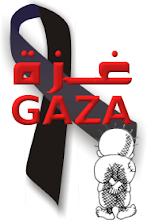
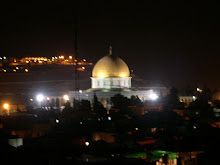





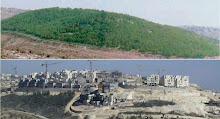



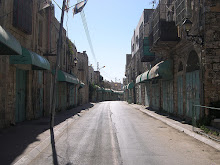
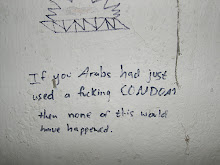
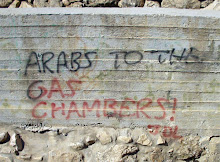

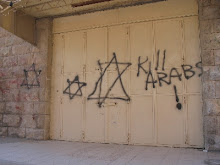
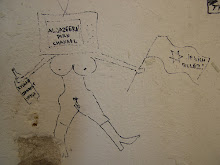
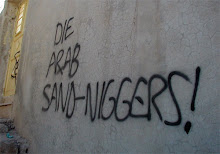
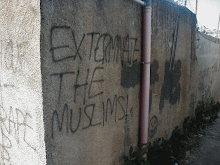
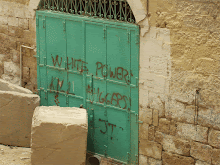



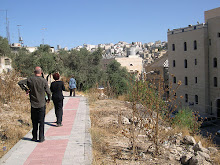

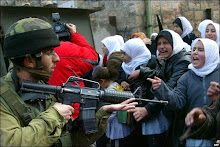
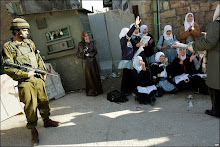
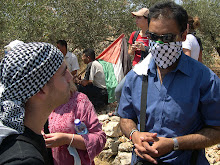
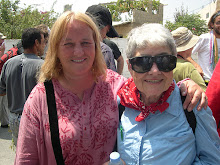
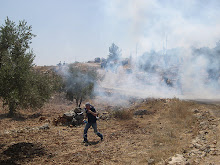
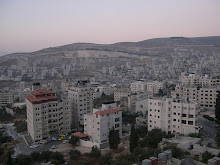

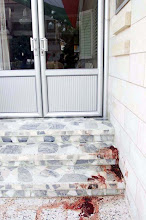








11 comments:
Very well written. This young person is indeed a brave young man and the world needs more people like him.
I am assuming he has gave up his time and effort and also money to find out things first hand.
If people read this and it makes them think, you know the person to contact.
Dear anonymous,
Thank you very much for your kind words. If even one person is moved enough by my account to join the cause of the Palestinians, it will make our trip worthwhile.
I am not brave- that praise should be reserved for the Palestinians. Given the conditions in which they live, to exist is to resist!
Back in the UK now I miss them bitterly.
Dear Chest Doc
and all in Palestine from Manchester
Have followed your blog
Will Tony B have the same problems visiting Rammalah?
I hear he has an office there? Worth a visit!! ?
Keep us informed.
Thinking of you all and your safety.
Back in Manchester - report backs will help with the campaigns for jusice for Palestine. The BMA boycott plan will follow on well from those in UCU, UNISON etc
Take care
thinking of you all
Mark
on behalf of STWC Manchester
Thanks Mark- Tony B better stay invisible in Ramallah. Neither he nor his beloved George B are the slightest bit welcome in Palestine. The idea that this war criminal can speak of being a 'peace envoy' is beyond comprehension.
It has been a short meeting that we had, but you reflected nicely on many things that some of us need to know. I am happy to read the rest of your encounters and I'm sure that it is the best way to tell the story of the Palestinians correctly and effectively.
Thank you very much; I am proud of your friendship.
Thanks very much, wonderful blog.
Take good care and let us keep in touch.
P.S. I was so sad to see Shaden Abu-Hijleh's picture again.
Thank you for writing about your experiences, I found you via Dave at Complex System of Pipes who was writing about attending (once he gets his diary issues ironed out!) your talk in Manchester. Your word is spreading!
I was intrigued and revolted by Yoram Blachar and his rise to eminence, I did do some reading on him (one slight correction, I found Professor Dolev was reported to have made the 'broken fingers' comment and Blachar subsequently defended him and attacked the four witnesses to the interview) I think what you have revealed to me is a raging racism at work that desperately needs to be acknowledged and stopped. Apartheid is maybe the most politic way of referring to it, what you have recounted is a culture wide sickness and a state of denial in Israel. Your whole report is a lot to take in and I am still thinking about it and trying to formulate something productive. Thanks again for sharing this and I will pass on the truths you have illuminated.
Rickb
Thank you, you are indeed right. It was of course Eran Dolev, the IMA's head of medical ethics who made the comment about broken fingers. I stand corrected. As you say, Blachar defended the statement when questioned about it.
It is good that you're angry and do channelize it into something productive. A good starting place is spreading the word, as you are doing already.
Take care.
Hi,
I came to your talk at Manchester Uni last week and really enjoyed it, although what you showed was shocking and made my blood boil.
One point I did want to make is that, as far as I know, in Hebron it is not "illegal" for Palestinians to walk down Shuhada street, they are just prevented from doing so by the soliders outside Beit Hadassah, contrary to Israeli law (Palestinians are allowed to walk on the section from Checkpoint 56/Turpat Junction to Beit Hadassah).
Here is a link to a video on the subject at B'tselem
http://www.btselem.org/english/Video/20070311_Shuhada_closed.asp
I'm assuming that nothing has changed legally since then, although I might be wrong. Apologies if this seems to be nit-picking but I know that on such an emotive subject as Palestine, sometimes tiny errors in a talk or blog are seized upon by people with a different view point to "prove" that everything in that talk or blog is lies, and I do not want anyone to have such an opportunity with regard to your excellent blog and talks.
Joanna
Hi Joanna
Yes, you are absolutely right- on 25 Dec 2006 the Israeli courts concluded that the street had been closed 'in error' and it was illegal to prevent Palestinian movement.
Despite this court order though, the prohibition is still in place and enforced by the soldiers: as witnessed by us and as demonstrated in the video. No Palestinian is allowed to walk on Shuhada Street.
This is not the only example of court orders being paper exercises in Israel- as you may be aware, the Wall continues to be built near Billin despite the order to change its route.
If you want to cooperate in the future, leave your contact details on the blog (I vet all comments so it won't be publicised) or get hold of me through Action Palestine.
I would appreciate more visual materials, to make your blog more attractive, but your writing style really compensates it. But there is always place for improvement
Post a Comment